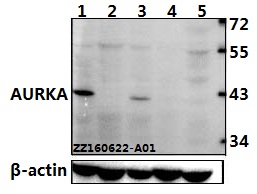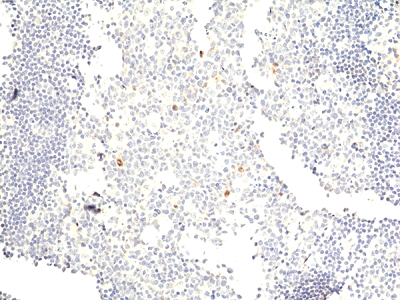anti-Aurora A antibody
ARG54060
ApplicationsImmunoFluorescence, Western Blot, ImmunoCytoChemistry
Product group Antibodies
ReactivityHuman
TargetAURKA
Overview
- SupplierArigo Biolaboratories
- Product Nameanti-Aurora A antibody
- Delivery Days Customer23
- ApplicationsImmunoFluorescence, Western Blot, ImmunoCytoChemistry
- CertificationResearch Use Only
- ClonalityMonoclonal
- ConjugateUnconjugated
- Gene ID6790
- Target nameAURKA
- Target descriptionaurora kinase A
- Target synonymsAIK, ARK1, AURA, BTAK, PPP1R47, STK15, STK6, STK7, aurora kinase A, aurora 2, aurora/IPL1-like kinase, aurora/IPL1-related kinase 1, breast tumor-amplified kinase, protein phosphatase 1, regulatory subunit 47, serine/threonine protein kinase 15, serine/threonine-protein kinase 6, serine/threonine-protein kinase aurora-A
- HostMouse
- IsotypeIgG1
- Scientific DescriptionMitotic serine/threonine kinases that contributes to the regulation of cell cycle progression. Associates with the centrosome and the spindle microtubules during mitosis and plays a critical role in various mitotic events including the establishment of mitotic spindle, centrosome duplication, centrosome separation as well as maturation, chromosomal alignment, spindle assembly checkpoint, and cytokinesis. Required for initial activation of CDK1 at centrosomes. Phosphorylates numerous target proteins, including ARHGEF2, BORA, BRCA1, CDC25B, DLGP5, HDAC6, KIF2A, LATS2, NDEL1, PARD3, PPP1R2, PLK1, RASSF1, TACC3, p53/TP53 and TPX2. Regulates KIF2A tubulin depolymerase activity. Required for normal axon formation. Plays a role in microtubule remodeling during neurite extension. Important for microtubule formation and/or stabilization. Also acts as a key regulatory component of the p53/TP53 pathway, and particularly the checkpoint-response pathways critical for oncogenic transformation of cells, by phosphorylating and stabilizating p53/TP53. Phosphorylates its own inhibitors, the protein phosphatase type 1 (PP1) isoforms, to inhibit their activity. Necessary for proper cilia disassembly prior to mitosis.
- ReactivityHuman
- Storage Instruction-20°C
- UNSPSC12352203


![Aurora A antibody [C3], C-term detects Aurora A protein at spindle by immunofluorescent analysis. Sample: HeLa cells were fixed in ice-cold MeOH for 5 min. Green: Aurora A stained by Aurora A antibody [C3], C-term (GTX104620) diluted at 1:500. Red: alpha Tubulin, a cytoskeleton marker, stained by alpha Tubulin antibody [GT114] (GTX628802) diluted at 1:500. Blue: Hoechst 33342 staining.](https://www.genetex.com/upload/website/prouct_img/normal/GTX104620/GTX104620_43033_20180110_ICC_IF_w_23060120_926.webp)




